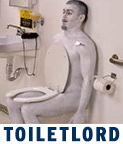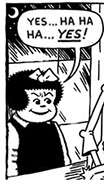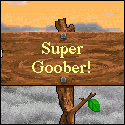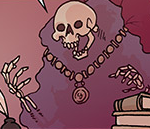|
hyphz posted:The Jenga in Dread is representing a diminishing resource of unknown quantity, not acting as a randomizer. yeah, but aren't we talking about non-dice conflict resolution and tests of success vs failure mechanics? Not just strictly non-dice randomization. Hel posted:For heroic games you can take inspiration from "muscle marines in space" where you have to arm wrestle the GM to determine if you succeed or not. oh or the old LARP standby of rock paper scissors
|
|
|
|

|
| # ? May 28, 2024 03:42 |
|
Just disembowel a chicken and read the entrails to determine success/failure.
|
|
|
|
Macdeo Lurjtux posted:Just disembowel a chicken and read the entrails to determine success/failure. Tea leaves are a cheaper option. Reading the sticks requires an oracular pig but is otherwise reusable.
|
|
|
|
Macdeo Lurjtux posted:Just disembowel a chicken and read the entrails to determine success/failure. Play Everway, resolve actions by literally doing Tarot readings.
|
|
|
|
Alhireth-Hotep posted:Play Everway, resolve actions by literally doing Tarot readings. Man the examples of how to use that resolution deck in Everway are so bad. Like insanely bad.
|
|
|
|
How does Everway work?
|
|
|
|
Keith Baker's game Phoenix: Dawn Command is based on playing sets of cards, with various values, in order to meet a target number. I suppose it's kind of like a more complex version of point-based diceless games, in that you can usually make sure you succeed at the stuff you most care about—outside of combat at least. There are class abilities, and other resources, to modify card results and certain cards have narrative effects in addition to their numerical value. I haven't had much of a chance to play it, but what I have played was interesting.
|
|
|
|
I built a game for a class using blackjack rules as my randomization mechanic. Target numbers for difficulty range from 16-20. 16 for easy challenges, 20 for very hard challenges Under the target number or over 21? Fail. If you exceeded 21, the DM advances the skill clock 1 step or a monster of choice gets an extra action. Hit a blackjack? Critical success. You step the skill clock back 1 step or get an extra action Skills ranged from -2 to +3. If you have a positive modifier, you can add or subtract your to total by up to that amount. You have a negative modifier, the DM can adjust the target number by up to the modifier. berenzen fucked around with this message at 09:29 on Sep 28, 2018 |
|
|
|
berenzen posted:I built a game for a class using blackjack rules as my randomization mechanic. That's honestly not the worst system I've seen, just a lot more complicated than rolling a die.
|
|
|
|
Liquid Communism posted:That's honestly not the worst system I've seen, just a lot more complicated than rolling a die. Seems like your skills would have a huge impact on the game despite the small range of numbers involved; a +3 means you get a crit on anything from an 18 to a 24.
|
|
|
|
Has White Wolf announced who will be replacing their old CEO yet?
|
|
|
|
Thuryl posted:Seems like your skills would have a huge impact on the game despite the small range of numbers involved; a +3 means you get a crit on anything from an 18 to a 24. No, "a blackjack" is specifically an opening deal of an ace and a 10-value card. (The OG blackjack that gives the game its American name was a promotional stunt, a super jackpot paid out on the ace of spades and a black jack, but that's rare enough any blackjack-based game resolution probably shouldn't incorporate it.)
|
|
|
|
Zurui posted:How does Everway work?
|
|
|
|
Glazius posted:No, "a blackjack" is specifically an opening deal of an ace and a 10-value card. (The OG blackjack that gives the game its American name was a promotional stunt, a super jackpot paid out on the ace of spades and a black jack, but that's rare enough any blackjack-based game resolution probably shouldn't incorporate it.) Oh, right, I think I knew that at one point but forgot. I'd still wanna see how different skill bonuses translate to chances of success at each difficulty assuming optimal play.
|
|
|
|
Removing randomness in RPGs makes the impact of player skill more apparent. In a high-skill low/no-randomness game, the more skilled player's character will get what they want much more often than a less-skilled player's character does. This can feel bad when you are in a not purely cooperative part of the game. So you can go low-randomness/high-skill in a combat subsystem or a kind of skill challenge subsystem since the player characters are working together anyways. But you can't really do that for the other parts of most RPGs, where the characters are expressing their own individual goals and desires because it will feel unfair when how good a character is at talking to the princess is determined by their player's math skills. For that part you can go low-randomness and low/no-skill by making outcomes uniform, but that uniformity can be very boring. You can use class-based design to make outcomes non-uniform between players - then you need a game design that has decent class balance and a campaign design that properly incorporates each class (so the hacker gets to hack sometimes but doesn't get to always hack everything, for instance). High-randomness high skill is something like 4e combat where you get to make a lot of choices, but if the dice don't go your way you can still do badly even if you make skilled choices and you can still do well even if you make poor choices as long as you keep hitting and the enemies keep missing. This is useful because it allows players to make skillful choices while still allowing the less-skilled players to overperform and be the hero sometimes. The last option is high-randomness low-skill, which is where most traditional skill systems lie. You don't have much in the way of meaningful choices to affect your roll, and you just rely on the dice. With proper fail-forward and/or partial success mechanics, this too has a place in RPGs. The high luck factor leads to unexpected results and as one roll leads to another, the string of unexpected results can lead you somewhere nobody foresaw. The lack of player skill allows the notion of character skill to come to the fore. So Strike! is high skill / moderately high randomness in combat (Miss Tokens reduce the variance from 4e so you can still get lucky but can't get too unlucky with your rolls), and it's high randomness / low skill out of combat.
|
|
|
|
dwarf74 posted:As was said above, it's literally through freeform improvisation based on tarot readings. How well does it work? I am sure there are some groups who swear by it, but I don't think it's a particularly viable way to resolve character actions in-game. Everything is based on how the DM interprets the cards, which means it mostly runs by their fiat. Nah, your character has stats and stuff. They range from 1 to 5 in (ugh) Earth, Air, Fire, and Water. You also might have magic and everyone has some powers, all of which have similar ratings. You can also have some skills in each of your various stats, and you add those ratings together to check against difficulties. If you're lower that the difficulty or if the DM feels like you also have the tarot deck, which the DM pulls from and interprets (with a crappy guide included).
|
|
|
|
I've been thinking about a game that could be resolved essentially by flipping a number of coins and counting who got more heads, and by how many. (Roll #D6 - 4/5/6 is a success - count successes)
|
|
|
|
Imagined posted:I've been thinking about a game that could be resolved essentially by flipping a number of coins and counting who got more heads, and by how many. Kingdom of Nothing works like this - to resolve actions you toss a handful of coins and count heads, to fit its theme of homeless people versus mysterious darkness
|
|
|
|
Imagined posted:I've been thinking about a game that could be resolved essentially by flipping a number of coins and counting who got more heads, and by how many. This is the core resolution mechanic in both Lady Blackbird and Burning Wheel, so I think it's a great resolution system.
|
|
|
|
DalaranJ posted:This is the core resolution mechanic in both Lady Blackbird and Burning Wheel, so I think it's a great resolution system. I loathe dice pool systems like that, because they dont establish a success floor. No matter how many dice you have, you can always roll 0 successes. In a roll+modifier system, you always have your modifier+1 as your success floor.
|
|
|
|
But in most of those you have a critical fail mechanic, which is effectively "zero successes".
|
|
|
|
Imagined posted:But in most of those you have a critical fail mechanic, which is effectively "zero successes". I actually can only think of two games off the top of my head with non-dicepool critfails. Dnd doesn't have them on most rolls, before you point there.
|
|
|
|
fool_of_sound posted:I loathe dice pool systems like that, because they dont establish a success floor. No matter how many dice you have, you can always roll 0 successes. In a roll+modifier system, you always have your modifier+1 as your success floor.
|
|
|
|
fool_of_sound posted:I actually can only think of two games off the top of my head with non-dicepool critfails. Dnd doesn't have them on most rolls, before you point there. But every idiot loves house ruling them in. Even in editions of d&d where the devs specifically tell you not to.
|
|
|
|
Splicer posted:What benefit does the success floor get you, realistically? In a lot of systems the numerical success floor is rarely a meaningful number, and systems where they are a meaningful number usually experience the related "success ceiling" problem. It matters a lot of when 'take 10' type rules are off the table, since they let you know what your character can do 100% of the time.
|
|
|
|
Coolness Averted posted:But every idiot loves house ruling them in. Even in editions of d&d where the devs specifically tell you not to. If you're talking about 5e -- 5e only mentions them on attack rolls, but does specifically mention in the DMG that you CAN use them for skill checks and such if you want. Which is not the same as "devs specifically tell you not to" in my book.
|
|
|
|
Imagined posted:If you're talking about 5e -- 5e only mentions them on attack rolls, but does specifically mention in the DMG that you CAN use them for skill checks and such if you want. Which is not the same as "devs specifically tell you not to" in my book. This is because the central design element of 5e is '3.5, as lazy idiot gms ran it'
|
|
|
|
fool_of_sound posted:This is because the central design element of 5e is '3.5, as lazy idiot gms ran it' I think this is pretty true. If you just kind of muddled around and didn't really care, 5e looks like an upgrade from 3e. If you actually spent the time to work with 3e/PF and get used to its quirks and guts, 5e is a strict downgrade not just because of relearning but because none of the systems are as useful, interesting, or powerful.
|
|
|
|
fool_of_sound posted:It matters a lot of when 'take 10' type rules are off the table, since they let you know what your character can do 100% of the time.
|
|
|
|
Splicer posted:Take 10 and skill floors are two different kettles of fish, my man. You can have Take 10 equivalents in a multiple dice success system. I don't think you understood my post. When the take 10 system is limited or not present, success floors matter,
|
|
|
|
Imagined posted:If you're talking about 5e -- 5e only mentions them on attack rolls, but does specifically mention in the DMG that you CAN use them for skill checks and such if you want. Which is not the same as "devs specifically tell you not to" in my book. Both 3.5 and 4th if I recall correctly removed critical fails/botches. Like 3.5 had "natural 1 on attack rolls only (and not skills)" is an autofail but no critical failures. -Though you probably wouldn't know that from playing since practically every 3.5/pathfinder DM I knew would count a 1 as a critical failure, and of course unlike critical hits didn't require 'confirming' because it just seemed 'fun' and they had no concept of the math. so fool_of_sound posted:This is because the central design element of 5e is '3.5, as lazy idiot gms ran it'
|
|
|
|
Edit: No, bad, no edition wars. No. Imagined fucked around with this message at 22:11 on Sep 29, 2018 |
|
|
|
Imagined posted:If by lazy you mean "doesn't want to look up literally 1500 feats in 300 different splatbooks", I guess I'm pretty lazy. Better to have the rules written than 'hmm yeah just make something up' "but there's too much content" is maybe the dumbest possible complaint about 3.5
|
|
|
|
Coolness Averted posted:Both 3.5 and 4th if I recall correctly removed critical fails/botches. Like 3.5 had "natural 1 on attack rolls only (and not skills)" is an autofail but no critical failures. D&D 3.5 had a condition where if you rolled a natural 1 on a saving throw against a magical attack "an exposed item is harmed (if the attack can harm objects)".
|
|
|
|
potatocubed posted:D&D 3.5 had a condition where if you rolled a natural 1 on a saving throw against a magical attack "an exposed item is harmed (if the attack can harm objects)". lol I never knew that rule existed, man no wonder so many people thought monks were OP, they were the only non caster immune to half of the lovely gotcha traps.
|
|
|
|
My friend and some of his friends want to try out roleplaying and need to do it online. They had a paid dm lined up that fell through. Other than roll20 forums where can they look?
|
|
|
|
Yo I'll run a game for $20.
|
|
|
|
Have they tried just, not paying for a DM and instead running it themselves like normal people? Or failing that, looking on rpg.net or here for games that are recruiting.
|
|
|
|
Coolness Averted posted:lol I never knew that rule existed, man no wonder so many people thought monks were OP, they were the only non caster immune to half of the lovely gotcha traps.
|
|
|
|

|
| # ? May 28, 2024 03:42 |
|
mastershakeman posted:My friend and some of his friends want to try out roleplaying and need to do it online. They had a paid dm lined up that fell through. Other than roll20 forums where can they look? Did they at least get a refund?
|
|
|































